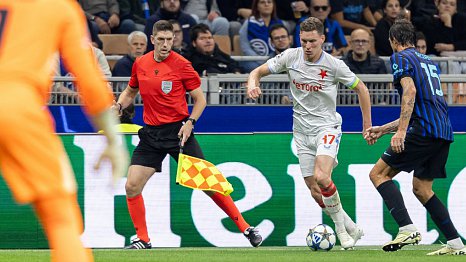
European journey to begin in the UCL 3rd qualifying round
Thanks to Atalanta’s league position, which won the Europa League final on Wednesday, and Slavia´s high club coefficient, we will begin our European journey in the third qualifying round of the non-champions path of the Champions League. If eliminated, we will play in the Europa League group stage. To advance to the elite competition, we need to win two two-legged ties.
We will know Slavia’s possible opponents for the third qualifying round in the coming weeks. Currently, it looks like the Belgian vice-champions (Royal Union SG), Twente, and qualifiers from the second qualifying round, which currently includes the vice-champions of Turkey (Fenerbahçe), Dynamo Kyiv, FC Lugano, and Partizan Belgrade. The draw will take place on July 22.
The third qualifying round will start on August 6 or 7, with the return leg on August 13. The potential playoff round will begin on August 20 or 21, with the return leg a week later.
An exciting new era for European club football awaits ????
Here’s how the #UCL will look from 2024/25 ???? pic.twitter.com/mEffFOpX2O
— UEFA Champions League (@ChampionsLeague) March 4, 2024
New UEFA Competition System
The European cups, as we know them, are ending. In the new format, there will no longer be traditional groups of four teams playing home and away matches against each other. The farewell to the traditional format took place this season, where we said goodbye with our first-ever group stage win ahead of AS Roma. The new group format will bring more matches against more opponents, promising more attractive encounters and drama until the end.
The preliminary round system remains the same, where eliminated teams gradually fall into the preliminaries of lower European competitions. An exception is the third qualifying round of the non-champions path of the Champions League, which guarantees participation in the Europa League group stage.
From the new season, both the Champions League and the Europa League will expand from 32 to 36 participants. All teams will compete in one large table in the so-called Swiss system, replacing the group stage with a league phase. Two additional places in the Champions League league phase have been given to national leagues whose teams performed best in European competitions in the previous season, this year being Germany and Italy. The winners of the Champions League and the Europa League from the previous season also have guaranteed spots. Since Atalanta qualified directly for the league phase of the Champions League through their domestic league, adjustments were made, promoting Slavia to the third qualifying round, otherwise, we would have started in the second qualifying round of the non-champions path.
At the beginning of the season, the traditional group stage draw will take place, but this time without the balls, as a computer will conduct the draw. Teams will be divided into four pots based on their club coefficients from the current five-year ranking. Then, eight opponents will be drawn for each team – two matches with teams from each pot, one at home and one away.
The matches will be played from September to January. Out of 36 teams, the top eight will advance directly to the round of 16, while teams ranked 9th to 24th will have to compete in a playoff round to reach the round of 16. The bottom twelve teams will be eliminated from the competition. From the round of 16 onwards, the classic knockout format with two-legged ties will continue, as we have known in previous years. From the new season, competitions will no longer overlap as they did this season, where we faced AC Milan in the Europa League round of 16, who finished third in their Champions League group and progressed through a playoff with the second-placed team from the UEL group stage.







